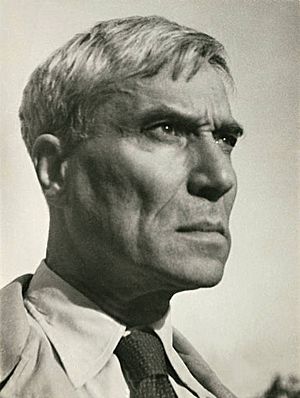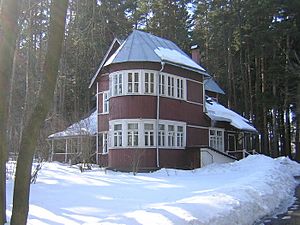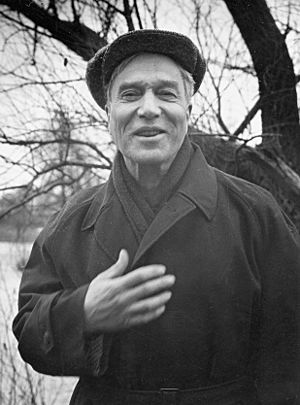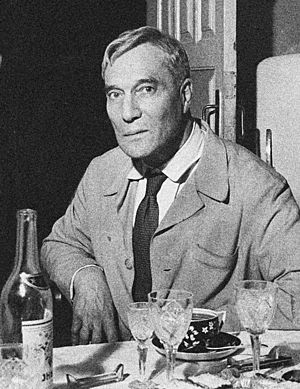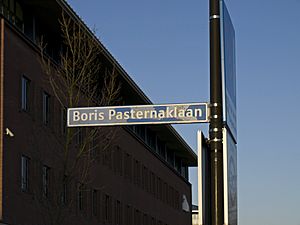Boris Pasternak facts for kids
Quick facts for kids
Boris Pasternak
|
|
|---|---|
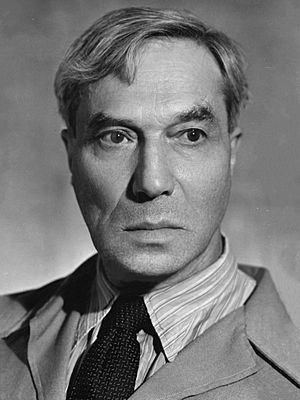
Pasternak in 1959
|
|
| Born | Boris Leonidovich Pasternak 10 February [O.S. 29 January] 1890 Moscow, Russian Empire |
| Died | 30 May 1960 (aged 70) Peredelkino, Russian SFSR, Soviet Union |
| Occupation | Poet, writer |
| Citizenship | Russian Empire (1890–1917) Soviet Russia (1917–1922) Soviet Union (1922–1960) |
| Notable works | My Sister, Life, The Second Birth, Doctor Zhivago |
| Notable awards | Nobel Prize in Literature (1958) |
| Parents | Leonid Pasternak and Rosa Kaufman |
| Relatives | Lydia Pasternak Slater (sister); Yevgeny Pasternak (son) |
Boris Leonidovich Pasternak (born February 10, 1890 – died May 30, 1960) was a famous Russian poet, writer, and translator. He is best known for his amazing novel, Doctor Zhivago. This book tells a story set during the Russian Revolution of 1905 and Second World War.
Pasternak's first book of poems, My Sister, Life, was published in 1922 and became very important in the Russian language. He also translated many plays by famous writers like William Shakespeare, which are still popular in Russia today. Doctor Zhivago was not allowed to be published in the USSR at first. However, the book was secretly sent to Italy and published there in 1957. Pasternak won the Nobel Prize in Literature in 1958 for his work. But the Soviet government was very angry and forced him to turn down the prize. Years later, in 1989, his son Yevgeny finally accepted the award for his father. Since 2003, Doctor Zhivago has been a part of the main school curriculum in Russia.
Growing Up: Boris Pasternak's Early Life
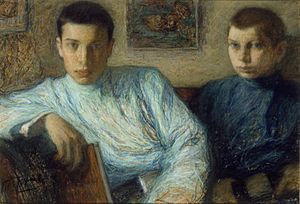
Boris Pasternak was born in Moscow on February 10, 1890. His family was well-off and Jewish. His father, Leonid Pasternak, was a famous painter and a professor at the Moscow School of Painting. His mother, Rosa Kaufman, was a talented concert pianist. Boris had a younger brother, Alex, and two sisters, Lydia and Josephine.
School and Early Interests
As a boy, Boris Pasternak was very interested in music. He was inspired by the composer Alexander Scriabin and even studied at the Moscow Conservatory. However, in 1910, he decided to change his path. He left the Conservatory and went to the German University of Marburg to study philosophy.
The Pasternak family was also close friends with the famous novelist Leo Tolstoy. Boris remembered that his father illustrated Tolstoy's books, and their home was filled with Tolstoy's ideas. His father even drew Tolstoy on his deathbed. Many famous artists and musicians, like Sergei Rachmaninoff, often visited their home.
Life as a Writer
Early Poetry and Love
After studying philosophy, Pasternak returned to Moscow. He fell in love with a girl named Ida Wissotzkaya. He even proposed to her, but her family felt he didn't have good enough job prospects, so she turned him down. This heartbreak inspired one of his poems called "Marburg."
Around this time, Pasternak joined a group of poets called the Russian Futurists. His first poems were published in their journal. His early poetry was very unique, using interesting sounds and everyday words. It also had hidden meanings related to his favorite poets.
During World War I, Pasternak worked at a chemical factory. This experience later helped him write Doctor Zhivago. Unlike many of his friends and family, Pasternak chose to stay in Russia after the October Revolution in 1917.
When his book of poems, My Sister, Life, was finally published in 1922, it changed Russian poetry forever. It made Pasternak a role model for younger poets.
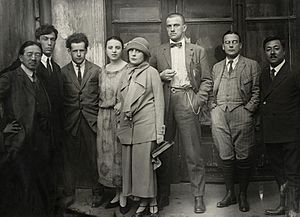
In 1922, Pasternak married Evgeniya Lurye, an art student. Their son, Yevgenii, was born the next year.
By the late 1920s, Pasternak felt that his complex writing style was hard for many people to understand. He tried to make his poetry simpler and also started writing stories about his own life.
In 1932, Pasternak fell in love with Zinaida Neuhaus, who was married to a famous Russian pianist. They both got divorces and married two years later. He continued to simplify his writing style, which you can see in his later book, Early Trains (1943).
Challenges During Stalin's Rule
Life in the Soviet Union became very difficult under Stalin's rule. In 1934, a poet named Osip Mandelstam recited a poem criticizing Stalin to Pasternak. Pasternak was very worried and told Mandelstam to pretend he hadn't heard it, because people were being arrested. Soon after, Mandelstam was arrested.
Pasternak bravely tried to help Mandelstam. He even received a phone call from Stalin himself. Stalin asked Pasternak what he thought about Mandelstam's arrest. Pasternak was very nervous and said he and Mandelstam had different ideas about poetry. Stalin then said, "I see, you just aren't able to stick up for a comrade," and hung up.
During the Great Purge in 1937, many people were arrested and punished. The Union of Soviet Writers asked all its members to sign a statement supporting the death penalty for some people on trial. Pasternak refused to sign, even when he was threatened. He told Stalin that he couldn't judge life and death. Pasternak expected to be arrested, but it is said that Stalin told others, "Do not touch this cloud dweller." Sadly, Pasternak's close friend, Titsian Tabidze, was arrested and died during the Purge.
World War II and After
During World War II, when German planes bombed Moscow, Pasternak helped as a fire warden on the roof of his building. He often helped remove German bombs.
In 1943, he was allowed to visit soldiers at the front lines. He read his poetry and talked with the troops. After the war ended in 1945, people hoped for peace and an end to Stalin's harsh rule. But instead, many innocent people were sent to labor camps called Gulags. Pasternak was very sad to see this happen.
Olga Ivinskaya
In 1946, Pasternak met Olga Ivinskaya, a single mother who worked for a literary magazine. He felt a strong connection to her, and they began a relationship that lasted the rest of his life. Although he never left his wife, Zinaida, Olga was very important to him.
In 1949, Olga was arrested by the KGB (the Soviet secret police). She was pregnant with Pasternak's child at the time and had a miscarriage while in prison. She was sentenced to ten years in the Gulag. Pasternak believed she was arrested because she was close to him, and the police hoped to get information from her to use against him. He later wrote that he owed his life to her bravery and strength.
Doctor Zhivago: A Famous Novel
Pasternak worked on Doctor Zhivago for many years, finishing it in 1955. He sent it to a Soviet magazine, but they refused to publish it. They didn't like that the book focused on individual people's lives rather than the "progress" of society. They also thought some parts were against the Soviet government, especially its criticisms of Stalin's policies.
However, things changed when an Italian journalist, Sergio D'Angelo, heard about the book. He worked for a publisher in Milan, Giangiacomo Feltrinelli, who was looking for new Soviet books. D'Angelo went to Pasternak and offered to publish Doctor Zhivago in Italy. Pasternak was surprised but gave him the manuscript, joking, "You are hereby invited to watch me face the firing squad."
Pasternak knew it was a big risk to publish his book outside the Soviet Union. But he hoped that because Feltrinelli was a communist, it might even encourage the Soviet government to publish the novel in Russia. Both Olga Ivinskaya and Pasternak's wife were worried, but Pasternak was determined.
In 1957, Feltrinelli announced he would publish the novel. The Soviet government demanded he cancel it, but Feltrinelli refused. He believed it was wrong to keep such a masterpiece from the world. Pasternak even sent secret letters telling Feltrinelli to ignore the Soviet demands.
Doctor Zhivago became an instant hit around the world when it was released in November 1957. The Soviet government's strong reaction against the book actually helped make it even more famous. In Russia, people couldn't read the banned novel, but they joked, "I haven't read Pasternak, but I condemn him."
Pasternak also wrote poems about Christian themes after World War II. He saw this as a way to protest against the government's ideas.
The Nobel Prize Controversy
Winning the Prize
People had been talking about Pasternak winning the Nobel Prize for Literature for many years. On October 23, 1958, it was announced that he had won! The award praised his Russian poetry and his role in continuing great Russian storytelling. Pasternak sent a telegram saying he was "Infinitely grateful, touched, proud, surprised, overwhelmed."
Forced to Decline
However, the Soviet government was furious. The next day, students at the Literary Institute in Moscow were forced to sign a petition against Pasternak and his novel. They were also told to join a protest demanding he be sent out of the Soviet Union. The Soviet newspaper published a letter that had rejected Doctor Zhivago years earlier, trying to justify their actions against him.
Pasternak was also told that if he went to Sweden to accept his Nobel Medal, he would not be allowed back into the Soviet Union. So, on October 29, Pasternak sadly sent another telegram to the Nobel Committee. He wrote that because of how the award was seen in his country, he had to give up this "undeserved distinction." The Swedish Academy announced that while his refusal didn't change the award's validity, the presentation couldn't happen. His son later said that Pasternak was completely changed that evening, pale and tired, only saying, "Now it all doesn’t matter, I declined the Prize."
Threats and Support
Even after he declined the award, the Soviet Union of Writers continued to criticize Pasternak in the newspapers. They even threatened to send him out of the country.
On October 31, 1958, the Union of Soviet Writers held a meeting where they called Pasternak an "internal émigré" and a "Fascist." They expelled him from the Union and asked the government to take away his Soviet citizenship and exile him. However, some people, like author Konstantin Paustovsky, refused to attend the meeting.
It is believed that the Indian Prime Minister Jawaharlal Nehru helped Pasternak. He called the Soviet leader Nikita Khrushchev and threatened to organize a group to protect Pasternak. This might have stopped Pasternak from being imprisoned. However, his son believes that all the persecution badly affected his father's health.
A famous cartoon about Pasternak, which won a prize, showed him as a prisoner in a labor camp, saying to another prisoner: "I won the Nobel Prize for Literature. What was your crime?"
Last Years and Death
In his last years, Pasternak wrote poetry about big ideas like love and life after death. He finished his last complete book, When the Weather Clears, in 1959. He also continued translating plays by other writers.
Pasternak started writing a trilogy of plays called The Blind Beauty, but he became ill with lung cancer before he could finish the first play.
Boris Pasternak died of lung cancer at his home in Peredelkino on May 30, 1960. His last words were about Olga Ivinskaya, saying she would suffer the most.
His Funeral
Even though only a small notice appeared in the newspaper, thousands of people came to Pasternak's funeral in Peredelkino. They bravely faced the police and KGB watching them.
At the funeral, someone with a "young and deeply anguished voice" began reciting Pasternak's banned poem Hamlet. The crowd cheered, and the church bells began to ring. Pasternak's grave became a special place for people who disagreed with the Soviet government.
The CIA and the Nobel Prize
Some researchers have looked into whether the American Central Intelligence Agency (CIA) played a role in Pasternak winning the Nobel Prize. Writer Ivan Tolstoy suggested that British and American intelligence agencies might have helped make sure Doctor Zhivago was submitted to the Nobel Committee in Russian. This was possibly to harm the Soviet Union's reputation around the world.
Documents declassified by the CIA in 2014 show that the CIA did work secretly to publish a Russian-language edition of Doctor Zhivago in the Netherlands. They wanted the book to be widely discussed and praised, and considered for honors like the Nobel Prize. They even handed out copies of the book to Soviet visitors at a fair in Brussels in 1958.
However, journalists who studied these documents said there was no clear sign that the CIA's main goal was to help Pasternak win the prize. Pasternak's son, Yevgeny, said his father knew nothing about the actions of Western intelligence services. He also said that the Nobel Prize only brought his father great sadness and trouble from the Soviet government.
Pasternak's Legacy
After Pasternak's death, Olga Ivinskaya was arrested again, along with her daughter. They were accused of helping Pasternak with Western publishers. Many of Pasternak's letters and writings were taken by the KGB. Olga was released after four years in prison. Her memories of her time with Pasternak were later published in Paris.
Pasternak continued to be criticized by the Soviet government until the 1980s, when Mikhail Gorbachev brought in new policies.
In 1980, an asteroid was named 3508 Pasternak after him. In 1988, Doctor Zhivago was finally published in Russia. In 1989, Pasternak's son Yevgenii was allowed to go to Stockholm to accept his father's Nobel Medal.
Since 2003, Doctor Zhivago has been part of the Russian school curriculum.
Remembering Pasternak
Pasternak's home in Peredelkino was made into a museum in 1986. Other museums dedicated to him opened in 1990 in Chistopol and Peredelkino. In 2008, another museum opened in Vsevolodo-Vilva, where he lived for a time.
Many monuments and memorial plaques have been put up to honor Pasternak in different cities in Russia and Ukraine. Stamps with his picture have also been issued in several countries. In 2021, Google celebrated his 131st birthday with a special Google Doodle.
Cultural Impact
- A minor planet (3508 Pasternak) is named after him.
- The Russian-American singer Regina Spektor uses a line from Pasternak's poem "Black Spring" in her song "Apres Moi."
Book and TV Adaptations
Doctor Zhivago has been adapted into films and TV series:
- The first movie, Doctor Zhivago, came out in 1965. It was very popular worldwide but couldn't be seen in Russia until later.
- A TV miniseries was made in 2002.
- A Russian TV version in 2006 is considered to be more like Pasternak's original novel.
Pasternak's Works
Poetry Collections
- Twin in the Clouds (1914)
- Over the Barriers (1916)
- Themes and Variations (1917)
- My Sister, Life (1922)
- On Early Trains (1944)
- Selected Poems (1946)
- Poems (1954)
- When the Weather Clears (1959)
- In The Interlude: Poems 1945–1960 (1962)
Books of Prose
- Safe Conduct (1931)
- Second Birth (1932)
- The Last Summer (1934)
- Childhood (1941)
- Selected Writings (1949)
- Collected Works (1945)
- Goethe's Faust (1952)
- Essay in Autobiography (1956)
- Doctor Zhivago (1957)
Images for kids
See also
 In Spanish: Borís Pasternak para niños
In Spanish: Borís Pasternak para niños


